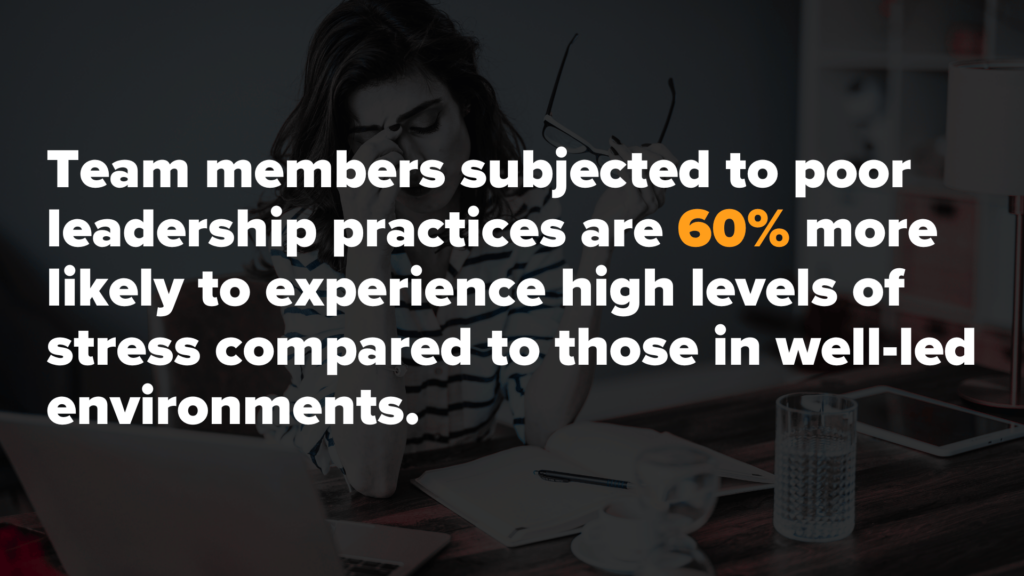
According to recent findings by Gallup, stress and other negative emotions such as sadness, anxiety, anger, and worry have been on the rise over the past decade. At the Chapman Foundation for Caring Communities, we believe that caring leadership plays a pivotal role in reversing this trend, fostering environments where both people and organizations can thrive.
A staggering 41% of employees report experiencing “a lot of stress” at work. More concerning is the fact that team members subjected to poor leadership practices are 60% more likely to experience high levels of stress compared to those in well-led environments (^1).
This data underscores an alarming trend that the quality of leadership within organizations profoundly impacts team members’ well-being, but it can also be a potential solution.
The Power of Great Leadership
Leaders are aware of the stress epidemic within their organizations. Gallup reports that a quarter of leaders feel burned out often or always, and two-thirds experience burnout at least sometimes (^1). Unfortunately, many of the popular solutions, such as well-being apps or stress management training, have shown little evidence of effectiveness. A study by the University of Oxford found minimal benefits from these interventions and even some small indications of harm (^1). The reality is, that no mindfulness app can compensate for the detrimental effects of poor leadership.
Instead, the focus must shift towards organizational-level initiatives. By investing in better leadership practices, organizations can create environments where employees feel seen, valued, and heard.
The Role of Caring Leadership
Caring leadership is a philosophy that places the well-being of employees at the forefront of organizational priorities. At the Chapman Foundation for Caring Communities, we advocate for transformational learning experiences that strengthen relationships, align teams, and build stronger communities. Here’s how caring leadership can make a profound impact:
1. Strengthening Relationships
Caring leaders prioritize building strong, personal connections with their team members. By fostering a culture of trust and open communication, leaders can create a supportive environment where team members feel comfortable sharing their concerns, thereby reducing feelings of isolation and stress.
2. Aligning Teams
Effective leadership practices involve aligning team goals with individual strengths and aspirations. This alignment not only enhances productivity but also fosters a sense of purpose and fulfillment among team members, contributing to better outcomes.
3. Building Stronger Communities
Organizations that value caring leadership extend their impact beyond the workplace. By promoting community-building initiatives and encouraging team members to engage in social causes, leaders can create a sense of belonging and collective purpose, further enhancing team member well-being.
The Competitive Advantage of Caring Workplaces
Implementing caring leadership practices offers a significant competitive advantage. Research indicates that employee engagement is driven more by great leaders than by labor policies or job markets (^2). Engaged team members are not only more productive but also more loyal, reducing turnover rates and fostering a positive organizational culture.
Additionally, addressing well-being proactively can mitigate the financial burden associated with absenteeism and reduced productivity due to stress-related issues. In the U.S., a new high of 29% of adults have been diagnosed with depression in their lifetime, with 17.8% currently being treated for it (^3). By prioritizing well-being, organizations can improve overall team member satisfaction and performance.
Conclusion
At the Chapman Foundation for Caring Communities, we are committed to empowering leaders with the tools and knowledge to create caring workplaces. The evidence is clear — great leadership practices can significantly improve well-being outcomes, creating thriving environments where team members and organizations can flourish.
If you are interested in transforming your leadership approach and building a caring workplace, we invite you to join us in this mission. Together, we can make a profound difference in the lives of individuals and the success of businesses.
To learn more about our transformational learning experiences and how we can help you implement caring leadership practices, click here.
Reference 1: Gallup: Can Great Management Improve Mental Health?
Reference 2: Gallup: Key Insights Into the Global Workplace
Reference 3: Gallup: U.S. Depression Rates Reach New Highs
Misty Janks, an organizational psychologist and strategic leader, is CEO of the Chapman Foundation for Caring Communities. Misty has over 20 years of experience in executive leadership and is skilled at creating holistic business approaches that unleash the power and potential of people inside the organization. Misty has a proven track record for shifting organizational cultures and aligning strategies to increase engagement, commitment, performance, and results. LinkedIn